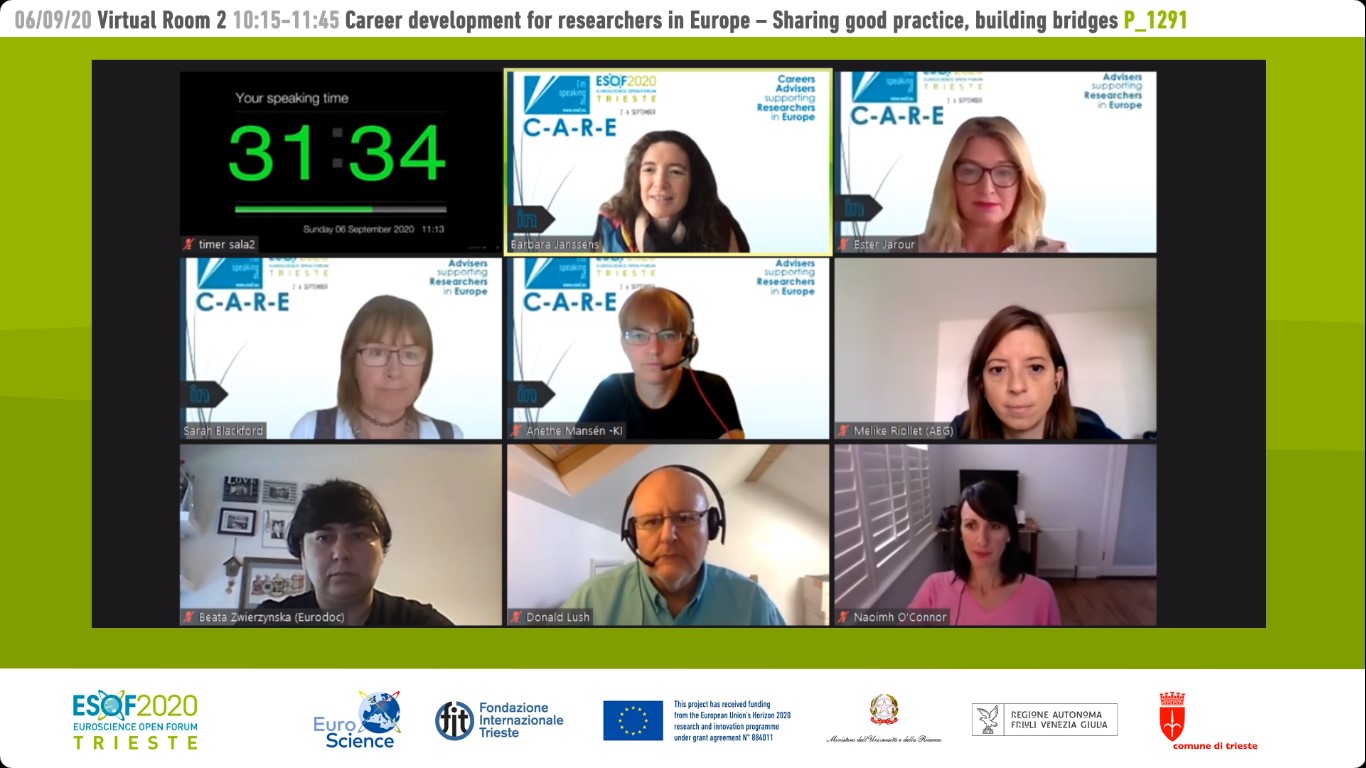23. Sept. 2020
The 9th edition of the EuroScience Open Forum (ESOF) conference took place from 2-6 September 2020 in a hybrid format and was a huge hit. This year’s innovative layout included a high-quality scientific discussion that achieved resounding success among on-site and online participants. The EuroScience Open Forum (ESOF) is a biennial, pan-European, general science conference that is dedicated to scientific research and innovation. Each conference aims to deliver stimulating content and lively debates centred on the latest advancements and discoveries in the science, humanities, and social sciences. Ester Jarour represented CEITEC in a panel discussion entitled, “Career development for researchers in Europe: Sharing good practices, building bridges.”

ESOF brings together leading thinkers, innovators, policymakers, journalists, and educators from more than 90 countries, to discuss current and future breakthroughs in contemporary science. ESOF is one of the best opportunities for everyone from leading scientists, early careers researchers, business people, policymakers, and science and technology communicators, to the general public, to come together and find out more about how science helps us to advance today.
Career Development for Researchers in Europe: Sharing Good Practices, Building Bridges
In this session, participants listened to the perspective of programme managers and professional career advisors, who belong to ‘Careers Advisers supporting Researchers in Europe’ (CARE), an 80-strong network of career advisors that was founded at ESOF 2014 in Copenhagen. In this session, speakers recalled examples of good practice, as well as provided information from the perspective of the unique experience at CEITEC, which built a career development program from scratch, with the help of career advisors from EU-Life institutes.
CEITEC was represented by Ester Jarour, who participated in a joint session with Anethe Mansén (Karolinska Institute), Naoih O´Connor (University College Dublin), Melike Riollet (Association Bernard Gregory), Donald Lush (King´s College London), Barbara Janssens (German Cancer Research Center), Sarah Blackford (Society for Experimental Biology), and Beata Zwierzynska (Eurodoc Board Member). The speakers emphasised the importance of investment in research and PhD training in Europe.
The career development training of doctoral candidates, postdoctoral researchers, and academics is widespread in Europe, but is patchy and inconsistent. Policies have helped in resolving these inconsistencies, such as appointing career advisors and introducing activities and events (internal and external) to assist in many aspects of career development, but there is still a lot of work to be done.
The speakers shared their experiences about career development programmes at their home institutes and interacted with the audience using online tools, such as Mentimeter. In collaboration with session participants and representatives from the academic community, the speakers aimed to build bridges in career development across Europe, and to create discourse around effectiveness and engagement. The speakers strived to capture opinions, stories, and experiences from a wide range of stakeholders during and after the session. The aim of the session was to build an inclusive picture across the European academic community and to assist in expanding and strengthening the career development support network, so that doctoral candidates, researchers, and academics would have a greater awareness of, and access to, professional career support, especially for those looking to transition out of academia into industry, business, and other non-academic careers.
ESOF 2020 in Numbers
Approximately 2,500 people registered for the event; within this group, more than 1,000 people participated in person in Trieste (Italy), and 1,400 people connected remotely every day. On average, each lecture was attended online by approximately 300 people, and the main event had 4,300 virtual visits in total. ESOF 2020 was in the global spotlight: online visitors came from 52 countries from 5 continents. In regards to online communication, particularly social networks, the ESOF 2020 Facebook page reached more than half a million people, with 26,000 interactions. There were 200,000 interactions on Twitter, and 237,000 visits on the ESOF 2020 website.
A Model for Science Diplomacy
There was a particular focus on Science Diplomacy, in which approximately 10 sessions were dedicated to this topic. Several projects focused on research and internationalisation, which attracted the local and remote public. This included sessions on “Building Bridges,” “Scientific Diplomacy for Freedom,” and the issue of refugee scientists, which included outstanding presentations by American economist Jeffrey Sachs, CERN Director Fabiola Gianotti, and Ghanya Al-Naqeb from Yemen, who shared her personal experience as a refugee scientist. This confirms that Trieste and the Mediterranean region are, quite rightly, fertile ground for merging different cultures, institutions, and people that are moving towards a common future.
Check on the ESOF session presentation HERE. More information about CEITEC Career Development for Researchers can be found HERE.


 Share
Share